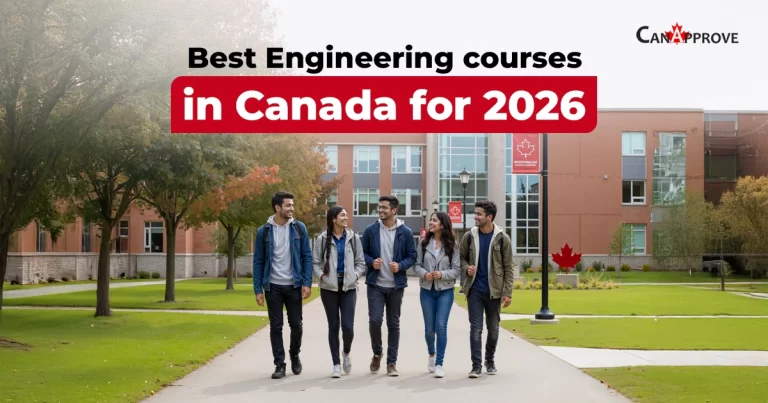Thanks to the internet! We’ve got more information on how to study abroad, but we are often misinformed and at times get unclear information. Even though you’re an alien to overseas education, this blog can help you paint your overseas education portrait with a perfect stroke!

Why should you study abroad?
Before the ‘How’, let’s know ‘Why’ you should study abroad.
- A chance to obtain a world-class education
- Experience the different cultures in one place
- Earning an international degree
- Research-based study programs
- Excellent career opportunities
- Explore new places and meet new people
- An effective pathway to obtain Permanent Residency status
Well, that’s not it. Studying abroad is an experience of a lifetime!
The scratch! – How to study abroad?
To begin with, you can start narrowing down the courses you’re interested in. If you’ve just completed your secondary education (12th grade), you can start researching undergraduate courses that you’re more affinitive to. In the case of post-graduation, you can look out for courses to upgrade your academic knowledge and increase your chances of employment.
You can learn about the best study abroad programs that are in demand by reading blogs that can help you sketch an idea. Have a look at our overseas education blogs!
Tip: Choose study programs that have a course duration of at least 8 months. However, opting for a minimum of 1-year or 2-year program is a cut above to obtain a Graduate Visa (in the UK) and PGWP (in Canada).
Country matters!
When it comes to knowing the best countries to study abroad, international students have an eye on countries like the United Kingdom, Canada, and Australia. Though there are good universities in the USA for higher studies when it comes to tuition fees and student benefits, students take a back seat. Canada, the UK, and Australia are mostly preferred by international students. Here are a few benefits of studying in the UK and Canada:
The UK
- Higher standard of Education
- Globally ranked universities
- Post-study work opportunities
- Work while studying options
- Stay back options up to 2 years
- Scholarships, bursaries, etc.
- Study without IELTS*
- Excellent research facilities
Note: *If you’re wondering “Can I study in the UK without IELTS?” Yes! You can study in the UK without IELTS in certain universities if you meet the following requirements:
- The medium of instruction of your previous education and school must be English
- You must have scored 75% marks in your 10th and 12th grade
However, you must check the specific university website regarding this.
Canada
- Quality education system
- Top-ranked universities
- Cultural melting pot
- Post-graduate work permit
- Part-time job options
- Effective path to obtain Canada PR
- Multitude of job opportunities
Once you’ve learned about the countries and their benefits, now it’s time to set your target right!
Mind the Intakes!
There are 3 intakes you can choose from when you study abroad such as
- Winter or January Intake
- Summer or May intake
- Spring/fall or September intake
Every intake has its own pros and cons, make sure to decide on it. September is one of the most popular intakes since all courses are open to students. Know more about the intakes here!
Take the IELTS!
International English Language Testing System (IELTS) is the most accepted test to prove your English proficiency to study in countries like Canada, the USA, the UK, and Australia. It has 4 bands namely Reading, Writing, Speaking, and Listening. You must score 6.5 in each band and above and not less than 6.
For applying to the universities/colleges, you must have a valid IELTS score. However, as stated earlier certain institutions in the UK accept applications and admission without an IELTS score.
Get into action!
Now that you’re all set, start applying to the universities in the country you’ve decided on. Search for the best universities abroad where your course is available. Here’s what you should look for:
- Check the global rank of the college
- Know about the academics and the college infrastructure
- Check upon the facilities such as accommodation, libraries, etc.
- In the case of Canadian universities, you must make sure to apply to DLI registered universities in Canada to be eligible for obtaining a Study Permit
- Research the vicinity of the university/college, make sure it’s good for finding accommodation, transportation, etc.
Shortlist at least 2 to 3 colleges and start applying and wait till you receive an ‘acceptance letter’ from the institutions.
The application process can be quite unfamiliar to you and hard to decide on courses and courses. You can always get the service of overseas education experts of CanApprove to make your admission hassle-free!
Info bite: In the UK, it’s called a Confirmation of Acceptance for Studies (CAS) while in Canada it’s called a Letter of Acceptance (LOA).
Waiting game!
Now all you must do is nothing but wait. Universities take time to review your application, usually around 3 to 4 weeks to send you an Acceptance Letter. However, there are times when institutions send the Acceptance letter within a week. So, sit back and relax! Fingers crossed!
The big day!
And in a few weeks, you receive a mail named, ‘Acceptance Letter’ and it’s all about surprises and excitement. Pat yourself for going this far! Read the acceptance letter thoroughly and know all about the next step. Some universities ask you to pay a confirmation fee for your admission while other institutions ask you to pay partial or full tuition fees.
Once you’ve done with this, the next big step is obtaining a Study Visa.
Get that Study Visa stamped!
Only with an acceptance letter, you will be able to apply for a Study Visa. Obtaining a study visa involves:
- Writing a Statement of Purpose (SOP), which highlights your intentions to study the desired course in the country. Only upon a satisfying SOP, will the visa authorities will issue you a study visa or student visa.
- Medical Test is mandatory to enter other countries. While a general medical test is required for a Canadian student visa, a Tuberculosis (TB) test is a must for entering the UK.
Note: In the current situation in 2022, you must have taken the necessary Covid-19 vaccine shots to enter all foreign countries.
- Biometrics will be the final step for obtaining your Study Visa
With all that said and done, you will get your passport stamped as Student Visa before traveling to your education destination. Now, it’s all about packing your bags!
Touch down in a new land!
The very first airport you land is where the Visa officers issue you a Study Permit which is valid for the duration of your study program with an additional 90 days in the case of Canada.
With all the anticipation, get there and make new friends at your university. Enjoy studying, explore the new land, experience new people, and make the best of your overseas education!
Hope this blog gave you insights on how to study abroad from scratch to becoming an international student. With 23+ years of experience in overseas education, CanApprove is a veteran company that you can rely upon. Talk to our overseas education experts now!






Best Study Abroad Programs in Madurai
Hi Anaoveseas,
We’re glad to assist you. Book an Appointment or send a quick email to enquiry@canapprove.com Thank you!